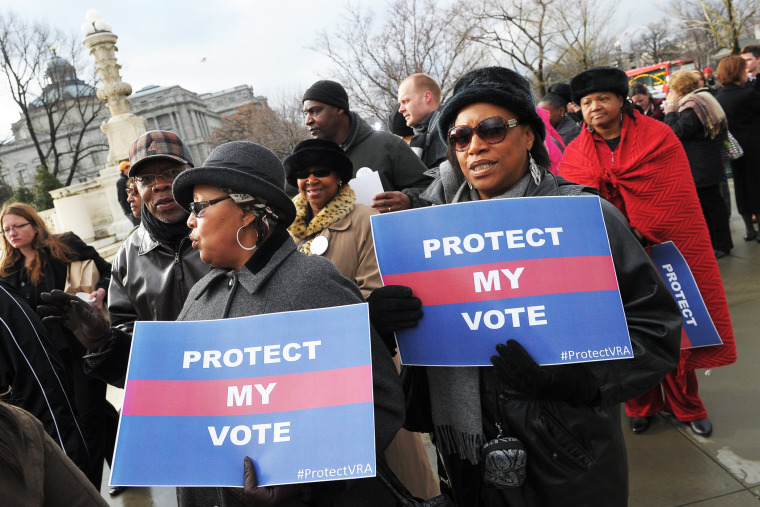As of yesterday, it's been exactly a year since conservatives on the Supreme Court, in a 5-4 ruling,
gutted the Voting Rights Act. The ruling, however, was
open-ended in a way -- the Republican-appointed justices didn't say which part of the Constitution the VRA violated, and it invited Congress to "fix" the law (though the justices didn't say how).
With this in mind, a bipartisan and bicameral group of lawmakers got to work, and in January they unveiled the Voting Rights Amendment Act, a reform bill intended to address the Supreme Court's concerns. Zachary Roth
reported yesterday that proponents haven't given up the fight.
Civil rights advocates pressed lawmakers Wednesday at a contentious Senate hearing to advance a bill that would strengthen the Voting Rights Act, saying a failure to do so would represent a historic betrayal of African-American aspirations for political equality. But Republicans appeared unmoved. "If the Voting Rights Act is not modernized, then you are effectively ending the second Reconstruction of the United States," Rev. Francys Johnson, the president of the Georgia NAACP, told members of the Senate Judiciary Committee.
At this point, the key barrier is finding Republican support. When Congress last considered the VRA, support for the law was nearly unanimous -- and in the Senate, it was literally unanimous -- but in the wake of the high court ruling, GOP support has evaporated. Indeed, as Roth's report noted, at yesterday's hearing, the Republican senators and the conservatives witnesses "acknowledged that race bias in voting still exists"; they just don't intend to support any new measures to prevent voting discrimination.
As of this afternoon, the Voting Rights Amendment Act has
zero Republican co-sponsors.
All of which leads us to a gentleman by the name of Thad Cochran.
Cochran, of course, is the senior senator from Mississippi, and just this week, he survived a very competitive Republican primary thanks in large part to support from African-American Democrats who saw the incumbent's challenger as vastly more offensive.
I
suggested yesterday that Cochran, as a gesture of goodwill and gratitude, can repay the favor by -- you guessed it -- throwing his support to the new Voting Rights Act. He'd already voted for the old one so it's really a fairly modest request.
In an interview with HuffPost Live, Derrick Johnson, president of the Mississippi NAACP, said that Cochran could thank black voters by supporting efforts to re-establish protections in the Voting Rights Act that the Supreme Court struck down last year. "Our advocacy towards his office is to support amending the Voting Rights Act, free of any conditions such as voter ID," Johnson said. "I think this is an opportunity for him to show some reciprocity for African-Americans providing a strong level of support for him."
The editorial board of the
New York Times is
on board, too.
The prospect of electing an intemperate Tea Party candidate who was openly nostalgic for Confederate days was so repellent to many black voters in Mississippi that they did a remarkable thing on Tuesday, crossing party lines to help give the Republican Senate nomination to Thad Cochran, in office for 36 years. Now it's time for Mr. Cochran to return the favor by supporting a stronger Voting Rights Act and actively working to reduce his party's extreme antigovernment policies.
Not to put too fine a point on this, but Cochran is positioned to keep his job because black voters showed up to save his skin. Why not return the favor by showing some leadership on voting rights?
In practical terms, Cochran's support wouldn't necessary help get the bill passed into law -- House Republicans will almost certainly kill the Voting Rights Amendment Act anyway -- so there's no real harm in the senator doing the right thing.
